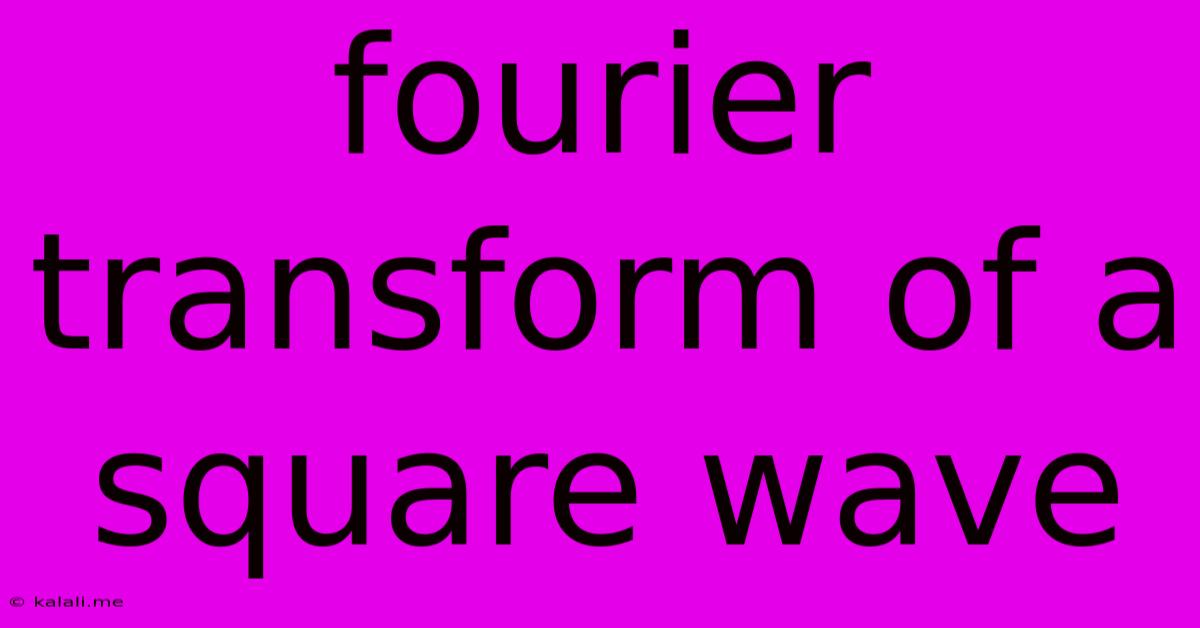Fourier Transform Of A Square Wave
Kalali
May 27, 2025 · 3 min read

Table of Contents
Decoding the Square Wave: Understanding its Fourier Transform
The seemingly simple square wave, with its abrupt transitions between high and low states, hides a surprisingly complex mathematical representation. Understanding its Fourier Transform is crucial in various fields like signal processing, electronics, and acoustics, as it reveals the underlying sinusoidal components that constitute this seemingly discontinuous waveform. This article delves into the intricacies of the Fourier Transform of a square wave, explaining the process and its significant implications.
What is a Fourier Transform? In essence, the Fourier Transform is a mathematical tool that decomposes a complex function (like our square wave) into a sum of simpler sinusoidal functions (sine and cosine waves). It reveals the frequency components and their amplitudes that contribute to the overall shape of the original signal. This decomposition is invaluable for analyzing and manipulating signals in the frequency domain.
The Square Wave: A Closer Look
A square wave is a periodic waveform that alternates between two voltage or amplitude levels. It's characterized by its:
- Period (T): The time it takes to complete one full cycle.
- Amplitude (A): The difference between the high and low voltage levels.
- Duty Cycle: The percentage of the period the wave spends at the high level. A 50% duty cycle means equal time spent at high and low.
Deriving the Fourier Series of a Square Wave
The Fourier Transform for a periodic signal like a square wave is expressed as a Fourier Series. This series represents the square wave as an infinite sum of sine waves with different frequencies and amplitudes. For a square wave with amplitude A and period T, the Fourier Series is:
f(t) = (4A/π) * [sin(ωt) + (1/3)sin(3ωt) + (1/5)sin(5ωt) + ...]
where:
ω = 2π/Tis the fundamental angular frequency.- Each term represents a harmonic, with frequencies being odd multiples of the fundamental frequency.
Interpreting the Results
The Fourier Series reveals some key characteristics:
- Odd Harmonics: The square wave only contains odd harmonics (1st, 3rd, 5th, etc.). This is a defining feature of its spectral composition.
- Amplitude Decay: The amplitude of each harmonic decreases inversely with its frequency (1/n, where n is the harmonic number). This explains why higher-frequency components contribute less significantly to the overall shape.
- Infinite Series: The accurate representation of a true square wave requires an infinite number of harmonics. In practice, we use a finite number of terms, leading to an approximation of the square wave with some Gibbs phenomenon (overshoots near discontinuities).
Implications and Applications
The Fourier Transform of a square wave has far-reaching implications across various fields:
- Signal Processing: Understanding the frequency components allows for filtering and manipulation of square wave signals. This is crucial in digital communication systems.
- Electronics: Analyzing the harmonic content helps in designing circuits that effectively generate or process square waves, accounting for potential distortion.
- Acoustics: Square waves are often used as test signals in audio systems. The Fourier Transform helps assess the frequency response and linearity of audio equipment.
Conclusion
The Fourier Transform elegantly reveals the hidden complexity within the seemingly simple square wave. By decomposing it into its constituent sinusoidal components, we gain profound insights into its behavior and characteristics. This understanding is critical for various applications, highlighting the power and versatility of the Fourier Transform in signal analysis and processing. Further exploration into different duty cycles and the effects of a finite number of harmonics can enrich this understanding further.
Latest Posts
Latest Posts
-
Can You Can Peaches With Skin On
May 29, 2025
-
What To Do If You Mix Bleach And Pine Sol
May 29, 2025
-
How To Pull Salesforce Report With Long Query
May 29, 2025
-
Linux How To Find Dns Server
May 29, 2025
-
Android For Rw Running Out Of Power
May 29, 2025
Related Post
Thank you for visiting our website which covers about Fourier Transform Of A Square Wave . We hope the information provided has been useful to you. Feel free to contact us if you have any questions or need further assistance. See you next time and don't miss to bookmark.